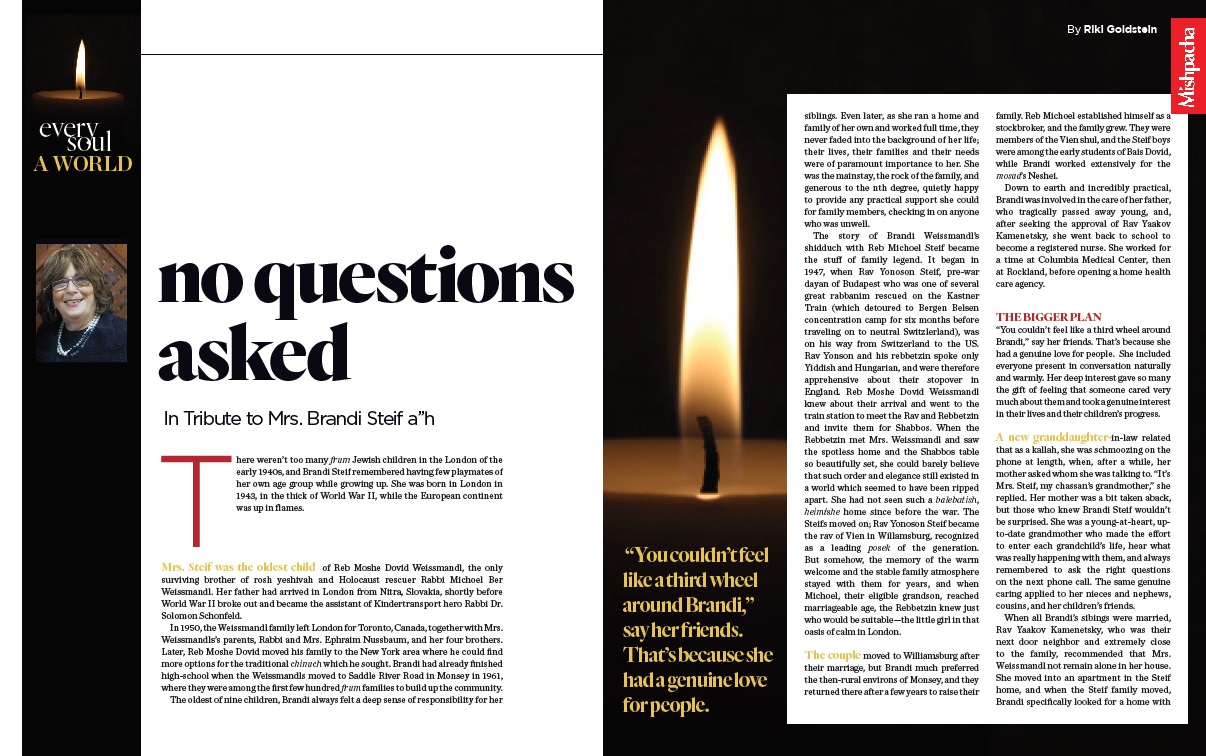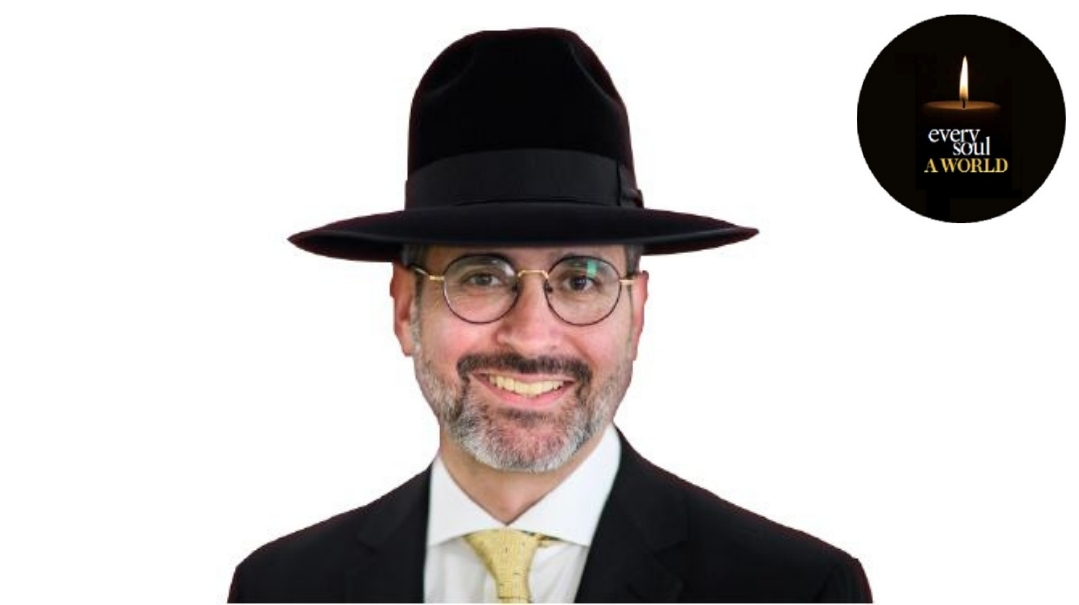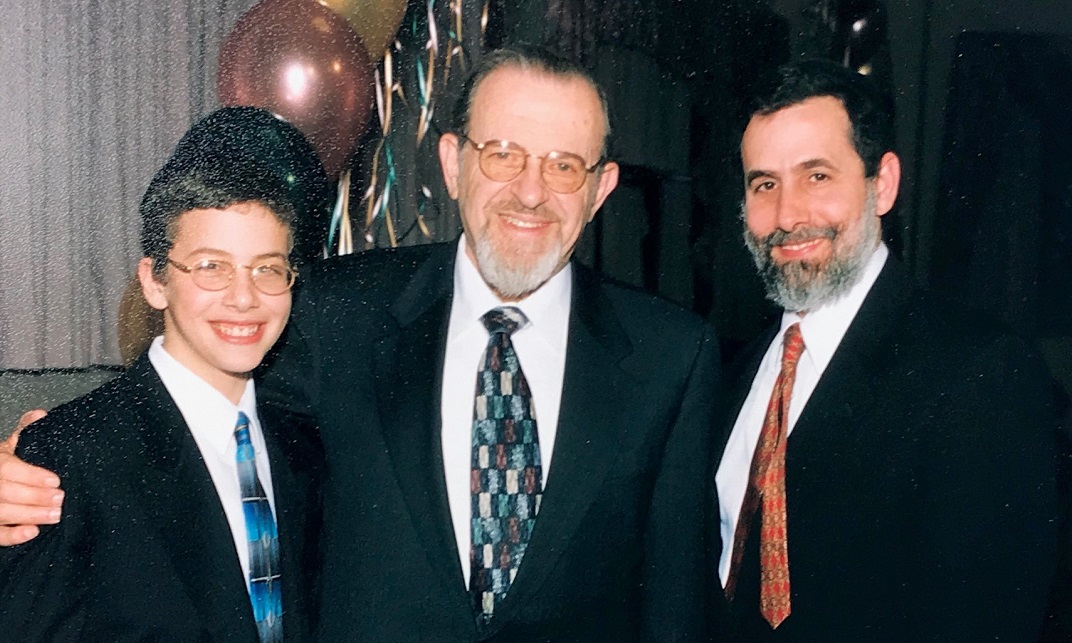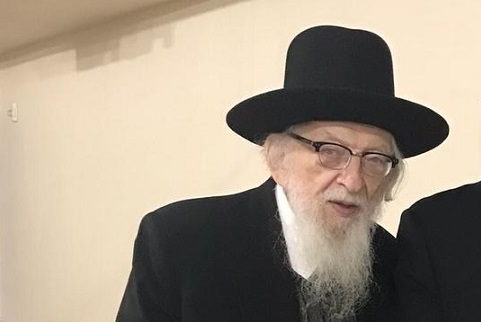Mrs. Brandi Steif
| April 27, 2020In Tribute to Mrs. Brandi Steif a”h
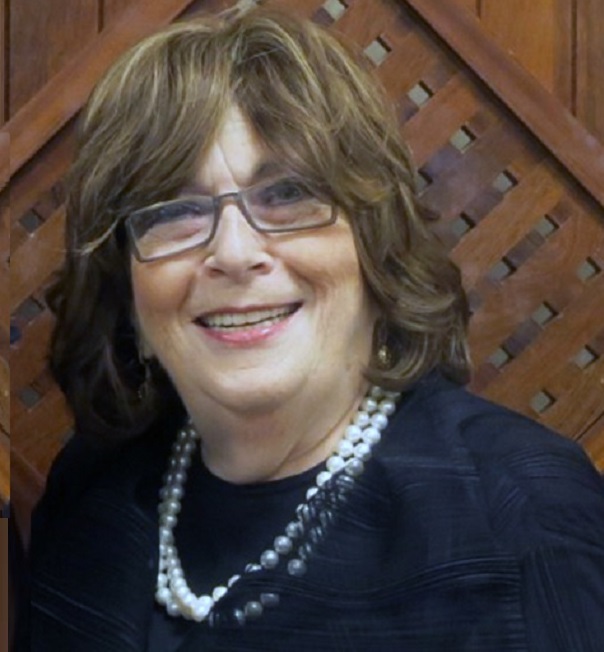
NO QUESTIONS ASKED
T

here weren’t too many frum Jewish children in the London of the early 1940s, and Brandi Steif remembered having few playmates of her own age group while growing up. She was born in London in 1943, in the thick of World War II, while the European continent was up in flames.
Mrs. Steif was the oldest child of Reb Moshe Dovid Weissmandl, the only surviving brother of rosh yeshivah and Holocaust rescuer Rabbi Michoel Ber Weissmandl. Her father had arrived in London from Nitra, Slovakia, shortly before World War II broke out and became the assistant of Kindertransport hero Rabbi Dr. Solomon Schonfeld.
In 1950, the Weissmandl family left London for Toronto, Canada, together with Mrs. Weissmandls’s parents, Rabbi and Mrs. Ephraim Nussbaum, and her four brothers. Later, Reb Moshe Dovid moved his family to the New York area where he could find more options for the traditional chinuch which he sought. Brandi had already finished high-school when the Weissmandls moved to Saddle River Road in Monsey in 1961, where they were among the first few hundred frum families to build up the community.
The oldest of nine children, Brandi always felt a deep sense of responsibility for her siblings. Even later, as she ran a home and family of her own and worked full time, they never faded into the background of her life; their lives, their families and their needs were of paramount importance to her. She was the mainstay, the rock of the family, and generous to the nth degree, quietly happy to provide any practical support she could for family members, checking in on anyone who was unwell.
The story of Brandi Weissmandl’s shidduch with Reb Michoel Steif became the stuff of family legend. It began in 1947, when Rav Yonoson Steif, pre-war dayan of Budapest who was one of several great rabbanim rescued on the Kastner Train (which detoured to Bergen Belsen concentration camp for six months before traveling on to neutral Switzlerland), was on his way from Switzerland to the US. Rav Yonson and his rebbetzin spoke only Yiddish and Hungarian, and were therefore apprehensive about their stopover in England. Reb Moshe Dovid Weissmandl knew about their arrival and went to the train station to meet the Rav and Rebbetzin and invite them for Shabbos. When the Rebbetzin met Mrs. Weissmandl and saw the spotless home and the Shabbos table so beautifully set, she could barely believe that such order and elegance still existed in a world which seemed to have been ripped apart. She had not seen such a balebatish, heimishe home since before the war. The Steifs moved on; Rav Yonoson Steif became the rav of Vien in Willamsburg, recognized as a leading posek of the generation. But somehow, the memory of the warm welcome and the stable family atmosphere stayed with them for years, and when Michoel, their eligible grandson, reached marriageable age, the Rebbetzin knew just who would be suitable—the little girl in that oasis of calm in London.
The couple moved to Williamsburg after their marriage, but Brandi much preferred the then-rural environs of Monsey, and they returned there after a few years to raise their family. Reb Michoel established himself as a stockbroker, and the family grew. They were members of the Vien shul, and the Steif boys were among the early students of Bais Dovid, while Brandi worked extensively for the mosad’s Neshei.
Down to earth and incredibly practical, Brandi was involved in the care of her father, who tragically passed away young, and, after seeking the approval of Rav Yaakov Kamenetsky, she went back to school to become a registered nurse. She worked for a time at Columbia Medical Center, then at Rockland, before opening a home health care agency.
The Bigger Plan
“You couldn’t feel like a third wheel around Brandi,” say her friends. That’s because she had a genuine love for people. She included everyone present in conversation naturally and warmly. Her deep interest gave so many the gift of feeling that someone cared very much about them and took a genuine interest in their lives and their children’s progress.
A new granddaughter-in-law related that as a kallah, she was schmoozing on the phone at length, when, after a while, her mother asked whom she was talking to. “It’s Mrs. Steif, my chassan’s grandmother,” she replied. Her mother was a bit taken aback, but those who knew Brandi Steif wouldn’t be surprised. She was a young-at-heart, up-to-date grandmother who made the effort to enter each grandchild’s life, hear what was really happening with them, and always remembered to ask the right questions on the next phone call. The same genuine caring applied to her nieces and nephews, cousins, and her children’s friends.
When all Brandi’s sibings were married, Rav Yaakov Kamenetsky, who was their next door neighbor and extremely close to the family, recommended that Mrs. Weissmandl not remain alone in her house. She moved into an apartment in the Steif home, and when the Steif family moved, Brandi specifically looked for a home with a comfortable and roomy apartment for her regal mother. This exceptional kibbud eim continued for 31 years.
As “Bubba” aged, this matriarch of a large family faced major health challenges, together with the loss of two of her children. During those years, Mrs. Steif was deeply involved in her care. She always made sure her mother had only the best in terms of living arrangements, company, assistance, and, in later years, aides. “Maybe this would be better for Bubba,” was always on her mind. During the last years of her mother’s life, Mrs. Steif traveled abroad to visit her children far less, reluctant to leave her, the shifts of aides and the latest numbers always on her mind. Bubba was treated as a queen, her dignity and absolute comfort maintained with no thought to expense.
When Bubba needed to be on a respirator, medical staff assumed that she would be remaining in a long-term care facility. They were shocked when Mrs. Steif said that she was planning to take her home, “because Bubba would want to be at home.” The arrangements were complex—frankly, people thought she was crazy—but after much research and using her own practicality and medical knowledge, Brandi found a respiratory company who could maintain a respirator in Bubba’s own home. She succeeded in keeping her mother in familiar, homey surroundings for a further six months.
Neither accolades nor acknowledgement of Brandi’s help were needed; she was utterly unassuming and made no noise about herself. She lived her life with a quiet, sincere effort to give of her assistance, skills, advice, resources, and tefillos to others. Raised in an environment of selfless giving, and generous by nature, she continued in her parents’ path, doing chesed discreetly and in a natural manner. Her heart was open to others, beginning with family members. Nothing delighted her more than finding out what someone needed or especially liked and then providing it.
Mrs. Steif took great pride in the array of chavrusas which her husband maintains. She eagerly encouraged his daily learning slots, and when they traveled to visit their children in Eretz Yisrael, Reb Michoel’s daily chavrusa was a non-negotiable part of their schedule.
Her emunah and bitachon were an absolute, deeply held reality. Brandi never preached; instead, she maintained a profound, quiet faith that carried her through many personal challenges. Following the courageous example set by Bubba Weissmandl, Brandi never allowed herself or her family to dwell on grief, complain, or sink into self-pity. Her approach was to accept the blow and move on bravely. Faced with adversity, she davened and truly believed that things would get better, but also excelled in acceptance of the present state of affairs. She did not complain, and her tefillos never assumed a desperate tone. Whatever difficulties she or her family faced, she knew, were part of Hashem’s plan.
A week after Purim, when Mrs. Steif was ill with pneumonia and the first waves of COVID-19 reached the community, the situation seemed grim. On the first day of her illness, she seemed anxious, but the next day, those who called were amazed at how calm she sounded. Her unquestioning emunah and peace of mind were the backdrop even in those final days.
VIEW/DOWNLOAD PDF FORMAT
Oops! We could not locate your form.

